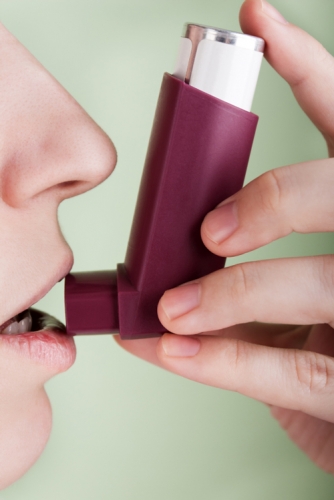Treatment Objectives
Asthma Treatment
Asthma Treatment
Treatment for asthma is available and can be controlled rather well with medication for most people. There are also adjustments to one’s living space that are suggested to prevent irritants. Understanding what triggers an asthma attack and using preventative measures can dramatically decrease inflammation inside the airways. Those afflicted with asthma are advised to see their doctor regularly for check ups.
Medications for the treatment of asthma
Asthma medication plays a key role in how well the condition is managed. There are two main types of medication prescribed for asthma: controller medications and quick relief medications.
Controller medications
The most important medication for those suffering from asthma are the controller medications due to the fact that they prevent asthma attacks. Patients will find that their airways are much less inflamed and a large reduction in asthma attacks.
- Long-acting beta-agonists / Bronchodilator
- Leukotriene modifiers
- Mast cell stabilizers
- Immunomodulator
Typical side effects may include:
- trembling
- headaches
- nervous tension
- heart palpitations
- muscular cramps
Quick-relief medications
These rescue medications work to relax the muscles around the airway. Those who exercise regularly will typically use a quick-acting medication called a beta-agonist before they workout. Medications provide quick relief of asthma attack symptoms like cough, chest tightness, wheezing.
- Short-acting beta-agonists (bronchodilators)
- Anticholinergics (bronchodilators)
- Systemic corticosteroids (anti-inflammatory drugs)
Typical side effects include:
- cataracts
- dry mouth
- constipation
- diarreah
- throat irritation and cough
- heartburn
- headaches
- worsening of glaucoma
There are a number of alternative treatments for asthma which patient’s will use alongside their medication.
- Acupuncture
- Air purifiers or ionisers
- Breathing exercises
- Nutritional supplements
- Traditional Chinese Medicine
Medicinal Cannabis Treatment for Asthma
The British Journal of Pharmacology has published a study showing how cannabis might have a similar effect on the airways as available asthma medications.
French researchers found by analysing human lung tissue, that THC was able to block the muscle contractions caused by acetycholine – a signaling molecule.
Acetycholine maintains muscle tone within the airways and causes the contractions in asthma attacks. Asthma medications block this same molecule, though they do so from a different angle.
A lung expert, Dr. Donald Tashkin, who is also a professor of medicine at UCLA, was one of the team members in the first study discovering cannabis and its effect as a bronchodilator. His group published a study back in 1973, in the New England Journal of Medicine explaining how our airways widen after smoking cannabis – this occurring in both healthy and asthmatic individuals.
Smoking however, contains numerous components that are both irritating to the respiratory tissue which in turn can lead to an inflammatory response. This is not a good thing for an asthmatic to endure. Dr. Tashkin’s work on this subject had ended though, before vaporisers were introduced as an alternative to smoking. Theoretically vaporisation may in fact offer a positive result – though it would need to be studied further.
Asthma Statistics in Australia
The prevalence of those suffering Asthma in Australia is recorded by the Asthma Foundation Australia. It is summarised below.
- In 2007-8, 9.9% of the population reported that they were suffering from asthma and it was current. Rounding up the percentile, we can say approximately 10% of the population (2 million people) in Australia is suffering from asthma currently. By international standards this number is high and the reason for it is unknown.
- There is a slight decrease in the prevalence of Asthma in children and young adults over the past few years.
- Prevalence of Asthma in older adults remains unchanged.
- The prevalence of Asthma is higher in people aged 75 and over, being at least 11%
- In the 0-14 year age group there are more boys than girls that are suffering with asthma
- In the 15 years and over age group, there are more females that suffer from asthma than males
- There is a higher prevalence of asthma in older people, children and those who live remotely
- Asthma tends to be more apparent in the indigenous populous of Australia
- Asthma effects more than 8 in 10 people in Australia.

What is Asthma?
Asthma is a disease of the airways. It is very common. When one experiences an asthma attack the airways narrow, restricting the amount of air that flows in and out of the lungs. When there is a restriction of air within the airways the body reacts with wheezing and coughing. Pollen, cigarette smoke and exposure to irritants and flu can all trigger and asthma attack. Though asthma cannot be cured, it can be managed effectively where sufferers can lead normal and active lives.
Causes of asthma
The triggers for asthma are what can be expected i.e.) lung irritants including:
- dust mites
- pet dander
- mould
- pollen
- cigarette smoke
- infections such as cold virus and flu virus
- cold air such as environmentally or from the likes of an air conditioner
- changes in the weather
- wood dust
- metal salts
- chemicals
- medication
Symptoms of asthma
Typical symptoms of asthma include:
- a tightness felt in the chest w
- wheezing – whistling when breathing
- coughing
- inability to breathe deeply
- shortness of breath
- symptoms are worsened at night
- symptoms are also worsened in the early morning and/or when active
In children symptoms of asthma may include
- inability to eat or drink
- crying
- fatigue
- irritability
- tummy ache and vomiting
- get more exhaustion out of playtime and activity
Clinical Studies / References:

